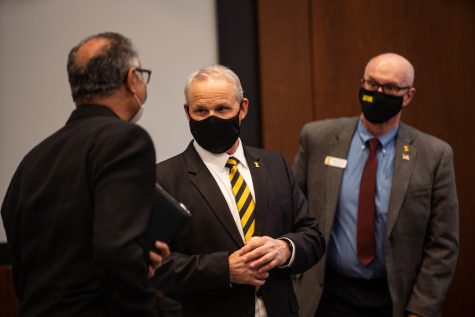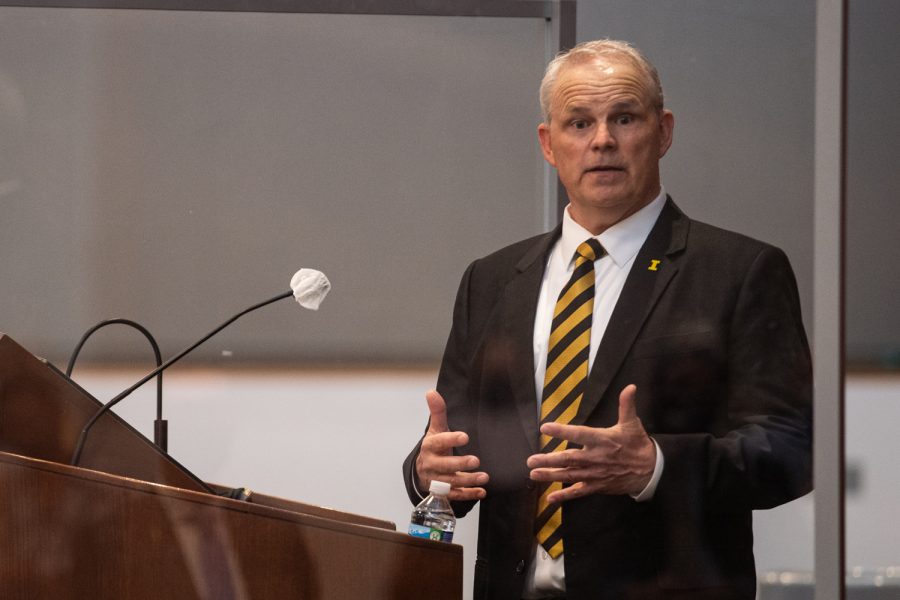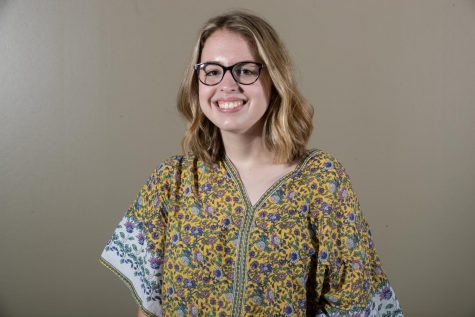Fourth UI Presidential Forum: UI College of Education Dean Daniel Clay emphasizes Iowa experience
In the final presidential forum Thursday afternoon, Dean of the College of Education Daniel Clay shared how he would leverage his experience as a UI administrator as the university’s leader.
Dean of the UI College of Education Daniel Clay addresses spectators and answers questions at the Levitt Center for University Advancement on Thursday, April 22, 2021. Clay is one of four finalists to become the next president of the University of Iowa.
April 22, 2021
In a public forum Thursday, fourth finalist in the search for the next University of Iowa president, Daniel L. Clay, presented his vision to use his existing experience as an administrator on campus as head Hawkeye.
Clay, dean of the UI College of Education since 2016, is the only internal candidate to be named a finalist in the presidential search. He was previously the dean of the University of Missouri College of Education, and a professor at the UI education college from 1997 to 2006.
Clay emphasized the importance of his experience and existing relationships within the university.
“I think any new president will have a lot to learn. What I think is an advantage for me is I know and trust and respect the people on our campus,” he said. “I can pick up the phone and call anyone in our cabinet or in our dean’s council, or in our staff and our other areas because we already have existing relationships. I think I do have a lot to learn, but that learning curve will be short.”
FIRST PRESIDENTIAL FORUM: Penn State College of Law Dean Hari Osofsky emphasizes collaboration, integrity in leadership
UI senior Carson Melinder said he thought Clay’s existing ties to the community of Iowa City could help address problems for college students, such as fair and equitable housing, employment opportunities, and the university’s overall ability to be more intertwined with the city.
“To hear that he places an emphasis and an importance on relationships, especially in the community, I think is really important,” Melinder said.
Clay said during his forum that he will also work to promote the value of the university to the entire state, after years of declining state appropriations.
“[Our next president] will have to be a champion for higher education, in the halls of the buildings on our campus, on the streets of our community — that will be really important,” he said. “They will have to talk about the value of our university in the small towns and cafés across the state of Iowa.”
In regard to protests last summer in Iowa City that responded to the murder of George Floyd and police brutality, Clay said campus administration should have been more present and listened to students.
Clay, who briefly worked as a police officer, said he won’t commit to defunding the UI Police Department, but supports the holistic model presented as part of the UI’s Reimagining Campus Safety initiative.

SECOND PRESIDENTIAL FORUM: University of Illinois System Executive Vice President Barbara Wilson emphasizes student voices, diverse team building
“As a president, I can assure you one thing, I will always be here, I will always listen to learn,” he said. “It’s easy to be president when we’re celebrating our national championship of our wrestling team. It’s hard to be president in times of crisis, but never is it more important for a president to be present and to be listening and to be learning.”
Clay has a background as a first generation college student who grew up in a small town, a trait which Katie Michalski, a second-year student and director of operations for Undergraduate Student Government, said she appreciated.
“I thought that first generation identity would be really important for a candidate because having somebody in such a high seat that has that identity would resonate with other students and maybe even attract other students to the university if they were in that same identity,” she said.
Community members have, however, raised concerns about Clay’s connection to two ongoing lawsuits. According to his CV, Clay founded the online learning school “Mizzou K-12 Online,” now known as “Mizzou Academy,” in his time at the University of Missouri. A Brazilian education firm brought a lawsuit against the program in 2019, alleging that the university breached its agreement to work with the firm “in good faith,” preparing students for college in the U.S.
Fewer than 10 of the thousands of students enrolled in the Mizzou K-12 Online program have actually gone on to attend the University of Missouri, the Kansas City Star reported in February, and the Brazilian firm claims it was cheated by MU after helping establish the program there. The online program’s owner Zac March retired from his post abruptly in 2019, according to the Star, and the lawsuit is ongoing.
Another ongoing lawsuit was first filed in 2018, when former director of the UI Realizing Educational and Career Hopes (REACH) program Pam Ries sued the university for gender, age, and pay discrimination. Then 63-year-old Ries led REACH, a transitional program based in the College of Education for students with cognitive and learning disabilities, from 2013-17.
Ries said in the lawsuit that Clay gave her the choice of retiring from her position or being fired. According to a 2018 article from The Gazette, Ries was fired and replaced with a man who was younger than her and paid more money than she had been in the same role.
THIRD PRESIDENTIAL FORUM: Georgia State Provost Wendy Hensel advocates for student success, hiring diverse UI administrators
The search for a new UI president commenced when current President Bruce Harreld announced his retirement in October 2020. The state Board of Regents appointed UI Graduate College Dean John Keller, co-chair of the presidential search committee, to serve as interim president, a position he will hold between Harreld’s departure and the arrival of the new president, likely in late summer or early fall.
The regents will meet at the UI April 29-30 to interview the finalists. The regents are expected to select the next UI president April 30. The deadline to submit feedback for all four of the candidates is April 26 at 5 p.m.
Following Clay’s forum on Thursday, USG President Regan Smock said she was impressed, despite feeling hesitant about an internal candidate initially.
“For me, there’s a big jump between dean and president, so I was a little nervous about that,” she said. “But he did a great job, I think, and I’m seeing some of the pros of that.”
Smock thinks all four of the candidates would be great UI presidents, which she said is a good situation to be in.
“There’s no one I’m hesitant wouldn’t make students a priority, especially in USG and GPSG,” she said. “In whatever form that looks like, I’m excited about it.”
















